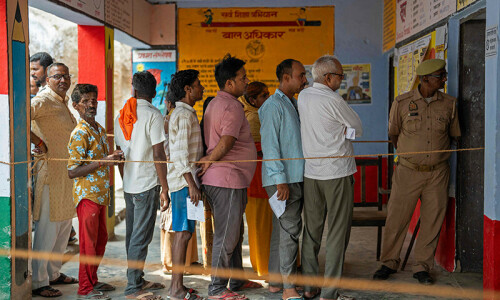WASHINGTON: The United States resumed air strikes in Iraq on Friday three years after withdrawing forces from there and vowed to help Iraqi forces defeat Islamist militants.
The air strikes will try to help Iraqi security forces, “as they go after the IS threat inside their country, to their people [and] to their sovereignty,” Pentagon Press Secretary Navy Rear Admiral John Kirby said. “Our focus is helping the Iraqis deal with this threat inside their country and in the broader region,” he added.
The Pentagon also said that two rounds of air strikes on Friday were part of a series of American strikes meant to halt the Sunni extremist advance on the Kurdish capital of Erbil.
Air strikes halt militants’ advance towards Erbil
Two US fighter jets dropped 500-pound laser-guided bombs on a truck and on the mobile artillery it was towing. The militants were using the artillery to shell Kurdish troops in northern Iraq.
In a statement issued by his office in Washington, Admiral Kirby said the United States had two clear objectives: relieving the humanitarian issue in northern Iraq’s Kurdistan region and protecting American personnel.
But reports from the region suggest that Friday’s air strikes have already halted the militants of the Islamic State group who were moving rapidly towards Erbil. US military advisers and diplomats also are stationed in Erbil.
US President Barack Obama announced in a televised speech that he had granted permission to launch air strikes if US personnel and facilities were imperilled. He also had expressed fear that the militants were conducting a campaign of genocide against the Yazidi, an Iraqi religious minority.
Mr Obama said US aircraft would also drop relief supplies for thousands of Yazidis and Iraqi Christians who have been stranded for days without food, water or shelter on the slopes of Sinjar Mountain.
“When we have the unique ability to help avert a massacre … we will”, Mr Obama said. The United States cannot allow anyone to commit genocide.
The decision to launch the strikes, however, was taken by the US Central Command, which is responsible for all US military operations in the greater Middle East, which stretches from Pakistan to Iraq.
But Mr Obama assured his war-weary nation he was not sending back ground troops to Iraq.
“As commander-in-chief, I will not allow [the United States] to be dragged into another war in Iraq,” he said.
Speaking from New Delhi, Secretary of Defence Chuck Hagel said the United States would continue to support the Iraqi government as well as Iraqi security forces against the extremist threat.
Mr Hagel said three aircraft dropped 72 bundles of emergency food and water supplies; 60 safely reached them.
The United Nations Security Council met in an emergency session late Thursday and urged member nations to do all they could to support the Iraqi government and ease the suffering. The council said attacks on civilians because of their ethnic background or religion might constitute a crime against humanity.
Admiral Kirby noted that the militants’ progress in Iraq had been swift and that the terrorist group was “well-led and well-resourced”.
“We have seen them strengthened there in the north, and that’s what led to the humanitarian disaster on Mount Sinjar -- this exodus of these people,” he said. “But towards the south and in and around Baghdad, we continue to see Iraqi security forces stiffen their resistance. They’re being assisted by Shia militia.”
The Pentagon official described the Islamist militants as “simply brutes, thugs and murderers” who had “no regard for human life or human dignity”.
He said it was not just Christians or the Yezidis they’re threatening.
“We do believe they pose a threat not just to Iraq, but to the region, and they do have aspirational desires to threaten western targets, to include the United States and American citizens,” he said.
Published in Dawn, August 9th, 2014













































Dear visitor, the comments section is undergoing an overhaul and will return soon.